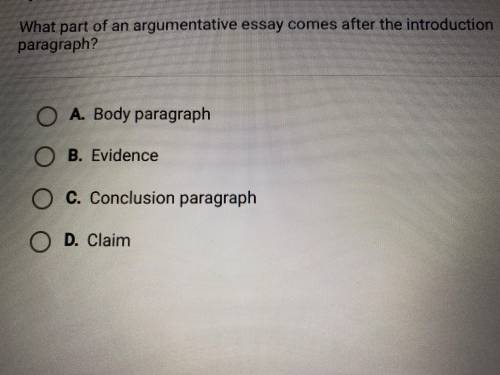What part of an argumentative essay comes after the introduction paragraph?
...

English, 08.04.2021 19:30 grantjaylynn
What part of an argumentative essay comes after the introduction paragraph?


Answers: 2


Another question on English

English, 22.06.2019 02:40
Julius caesar. [brutus.] with this, she fell distraught, and, her attendants absent, swallowed fire. cassius. and died so? brutus. even so. cassius. o ye immortal gods! [enter lucius, with wine and taper] brutus. speak no more of her. give me a bowl of wine. in this i bury all unkindness, cassius. cassius. my heart is thirsty for that noble pledge. fill, lucius, till the wine o'erswell the cup; i cannot drink too much of brutus' love. [exit lucius. enter titinius, with messala] brutus. come in, titinius; welcome, good messala. now sit we close about this taper here, and call in question our necessities. cassius. portia, art thou gone? brutus. no more, i pray you. what moral dilemma does brutus confront in this excerpt? brutus lets go of his anger toward cassius and forgives him. brutus decides that he will not mourn portia and will stay loyal to cassius. brutus decides that he is too angry at cassius to remain friends with him. brutus questions whether cassius's life should be ended.
Answers: 3

English, 22.06.2019 04:50
Read the passage, then answer the question that follows. no one could have seen it at the time, but the invention of beet sugar was not just a challenge to cane. it was a hint—just a glimpse, like a twist that comes about two thirds of the way through a movie—that the end of the age of sugar was in sight. for beet sugar showed that in order to create that perfect sweetness you did not need slaves, you did not need plantations, in fact you did not even need cane. beet sugar was a foreshadowing of what we have today: the age of science, in which sweetness is a product of chemistry, not whips. in 1854 only 11 percent of world sugar production came from beets. by 1899 the percentage had risen to about 65 percent. and beet sugar was just the first challenge to cane. by 1879 chemists discovered saccharine—a laboratory-created substance that is several hundred times sweeter than natural sugar. today the sweeteners used in the foods you eat may come from corn (high-fructose corn syrup), from fruit (fructose), or directly from the lab (for example, aspartame, invented in 1965, or sucralose—splenda—created in 1976). brazil is the land that imported more africans than any other to work on sugar plantations, and in brazil the soil is still perfect for sugar. cane grows in brazil today, but not always for sugar. instead, cane is often used to create ethanol, much as corn farmers in america now convert their harvest into fuel. –sugar changed the world, marc aronson and marina budhos how does this passage support the claim that sugar was tied to the struggle for freedom? it shows that the invention of beet sugar created competition for cane sugar. it shows that technology had a role in changing how we sweeten our foods. it shows that the beet sugar trade provided jobs for formerly enslaved workers. it shows that sweeteners did not need to be the product of sugar plantations and slavery.
Answers: 1

English, 22.06.2019 08:50
Ihad just taken a heavy lunch and i was taking à nap in a shade. i was alone left to take care of our home. i was awoken by à touch on m'y face and
Answers: 1

English, 22.06.2019 09:10
Vonnegut says that he can't visit the school because the story is called make your soul grow
Answers: 2
You know the right answer?
Questions

English, 30.04.2021 22:20

Mathematics, 30.04.2021 22:20

Mathematics, 30.04.2021 22:20


Mathematics, 30.04.2021 22:20

English, 30.04.2021 22:20


Advanced Placement (AP), 30.04.2021 22:20

Chemistry, 30.04.2021 22:20


Biology, 30.04.2021 22:20



Mathematics, 30.04.2021 22:20

Mathematics, 30.04.2021 22:20

History, 30.04.2021 22:20


Mathematics, 30.04.2021 22:20

Mathematics, 30.04.2021 22:20

Mathematics, 30.04.2021 22:20



